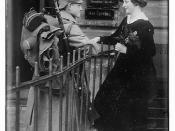This title question deals with a highly controversial and very sensitive issue especially for the German people. The outbreak of a First World War in 1914, and the horrors which it unleashed stimulated a hot debate on the question of 'war guilt.' It is possible to imagine that people felt they needed to place blame somewhere, and therefore that the Versaille Treaty requiring Germany to repay costs after the war was a manifestation of this. Conversely, many Germans during that period (as well as others to this day) vehemently believed that the German people were not to blame, that the war was an inexorable and unwitting result of factors out of the control of the individuals in power. It is also possible to imagine that this belief was to safeguard a desirable perception of themselves. Britain's claim for German innocence in later years could have only been said to maintain good relations with her.
These biased perceptions on both sides make it difficult to view past accounts of whether Germany deliberately caused the war as objective. This may be the case especially for the generation who lived through the war (such as Gerhard Ritter,) the next generation of historians therefore could be perceived more likely to deliver an objective story. This essay will outline some of the arguments given for and against Germany's aims of war up to 1914 in three categories of themes. It will then give the arguments for why the situation in 1914 was the moment Germany took to precipitate war.
Why might this question be important for us in the present? Eric Hobsbawm states that it is to help us understand past causes of war and recognise similar situations in the present. He continues "If we are interested in why a century of European peace...

![[German vehicle tax registration issued to George Grantham Bain] (LOC)](https://s.writework.com/uploads/6/60390/german-vehicle-tax-registration-issued-george-grantham-bain-thumb.jpg)

Great essay
Well organized! Deep insight!!!
1 out of 1 people found this comment useful.